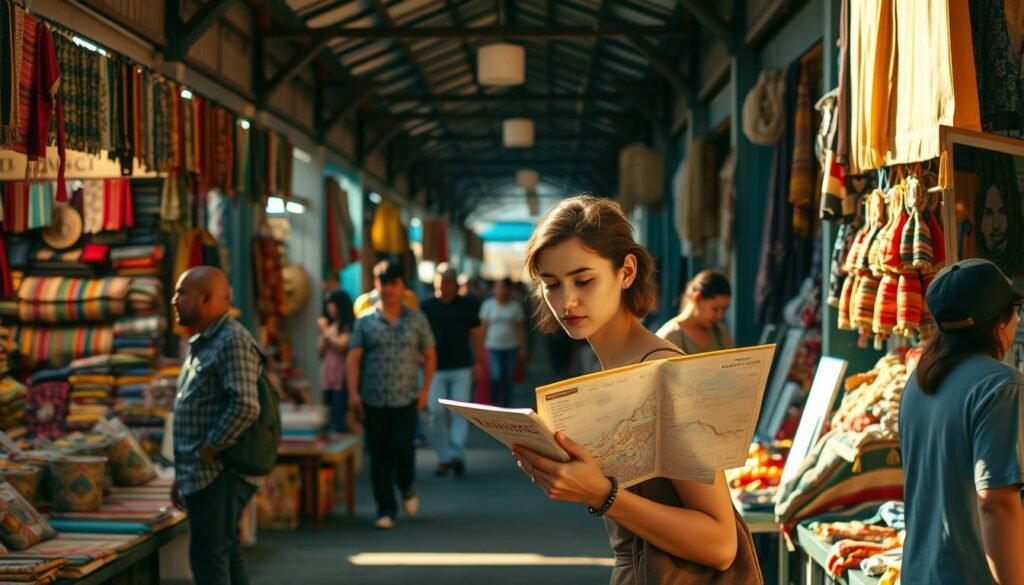Embarking on a solo adventure can be an exhilarating and liberating experience, allowing you to explore the world at your own pace and discover hidden gems. However, it’s crucial to prioritize your personal safety when traveling alone, especially in unfamiliar destinations. In this comprehensive guide, we’ll share essential tips to help you stay secure and make the most of your solo travel journey.
This post may contain affiliate links. If you make a purchase through one of these links, we may earn a small commission at no additional cost to you. As an Amazon Associate, we earn from qualifying purchases.
Key Takeaways
- Prioritize safety during solo travel to ensure a fulfilling and secure experience
- Comprehensive pre-trip planning is crucial, including documentation, insurance, and health preparations
- Choose accommodations carefully and take precautions to safeguard your personal belongings
- Employ smart packing strategies and carry essential safety gear to enhance your personal security
- Familiarize yourself with local customs and etiquette to navigate your destination safely and respectfully
Essential Pre-Trip Planning for Solo Travelers
Embarking on a solo adventure requires meticulous pre-trip planning to ensure a safe and seamless journey. From organizing essential documents to securing appropriate travel insurance, the preparation phase is crucial for solo travelers.
Documentation and Emergency Contacts
Before you set off, double-check that your passport, visa, and any other necessary travel documents are up-to-date and valid. Make digital and physical copies of these essential items, and share them with trusted contacts back home. Additionally, compile a list of emergency contacts, including local authorities, your embassy or consulate, and close friends or family members who can assist if needed.
Travel Insurance Coverage Types
Investing in comprehensive travel insurance is a must for solo travelers. Consider policies that cover medical emergencies, trip cancellations or delays, lost or stolen belongings, and even emergency evacuation. Research different coverage options to find the best fit for your specific needs and destination.
Pre-Trip Health Preparations
- Schedule a checkup with your healthcare provider to ensure you’re fit to travel and obtain any necessary vaccinations or medications.
- Familiarize yourself with the local healthcare system and services at your destination, and identify nearby hospitals or clinics in case of emergency.
- Pack a well-stocked personal first-aid kit to address minor medical issues during your trip.
By meticulously planning your pre-trip essentials, you can embark on your solo adventure with confidence, knowing that you’re prepared for any unexpected challenges that may arise along the way.
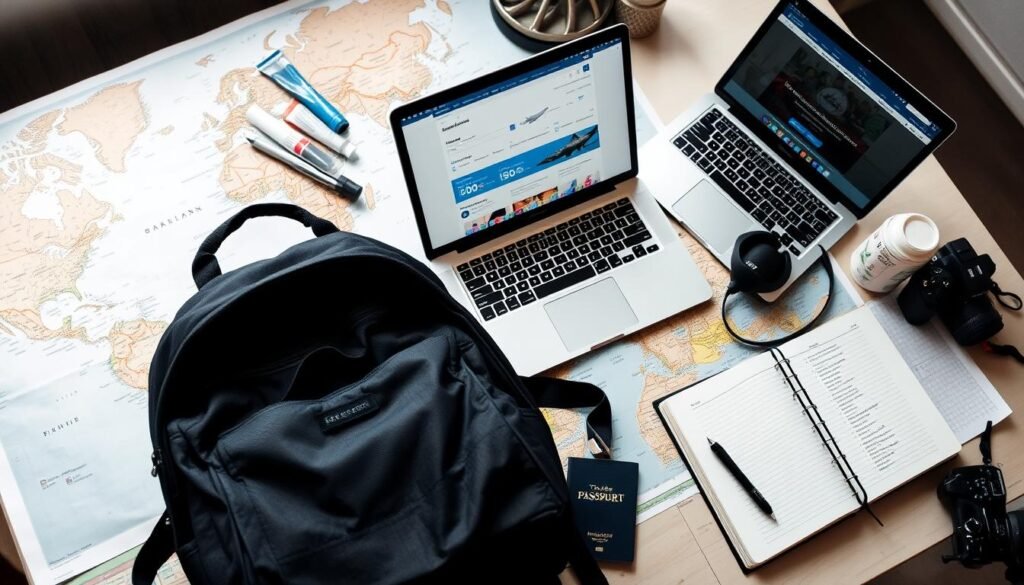
Choosing Safe Accommodation When Traveling Alone
Selecting secure and comfortable lodging is a crucial aspect of solo travel. When it comes to safe solo accommodation, there are several key factors to consider to ensure a worry-free experience.
First and foremost, the location of your accommodation plays a vital role in your safety. Choose hotels, hostels, or solo-friendly hotels situated in well-lit, bustling areas with a strong community presence. Avoid isolated or deserted neighborhoods, as these can increase the risk of potential threats.
Next, thoroughly research reviews from fellow solo travelers. Look for secure lodging options that consistently receive positive feedback regarding safety, cleanliness, and staff responsiveness. Online platforms like TripAdvisor and Hostelworld can be invaluable resources in this regard.
When booking your stay, pay close attention to the security features offered by the accommodation. Ideal options should include secure entry systems, 24-hour security personnel, and well-lit common areas. Additionally, consider the availability of in-room safes or lockers to store your valuables.
| Safety Feature | Importance for Solo Travelers |
|---|---|
| Secure Entry System | Ensures only authorized guests can access the building, providing an added layer of safety. |
| 24-Hour Security Staff | Offers a reassuring presence and immediate assistance in case of any emergencies or concerns. |
| Well-Lit Common Areas | Enhances visibility and reduces the risk of potential threats, especially during nighttime. |
| In-Room Safes/Lockers | Allows you to securely store your valuables, giving you peace of mind throughout your stay. |
By prioritizing safe solo accommodation and taking the necessary precautions, solo travelers can enjoy their adventures with a heightened sense of security and comfort.
Smart Packing Strategies for Personal Security
Packing for solo travel requires a strategic approach to ensure your personal security. Beyond the essentials, savvy solo travelers should consider including key safety gear, digital security items, and emergency kit components to enhance their protection while on the road.
Essential Safety Gear
When traveling alone, it’s wise to pack a few safety essentials. This might include a portable door lock, a personal safety alarm, and a sturdy flashlight. A high-quality travel lock can provide an extra layer of security for hotel rooms, while a personal safety alarm can deter potential threats. A reliable flashlight is also a must-have for navigating unfamiliar areas, especially at night.
Digital Security Items
In our digital world, safeguarding your personal information is crucial. Pack a VPN (Virtual Private Network) to secure your internet connection and protect your online activities. A physical RFID-blocking wallet or purse can also help prevent digital pickpocketing and the theft of sensitive information from your cards and devices.
Emergency Kit Essentials
- First-aid kit with bandages, antiseptic wipes, and medication
- Travel-sized personal hygiene items
- Extra cash in local currency
- Copies of important documents (passport, ID, etc.)
- Power bank for charging devices
By incorporating these solo travel packing tips, safety gear for solo trips, and travel security items into your luggage, you can enhance your personal security and feel more confident navigating your solo adventure.
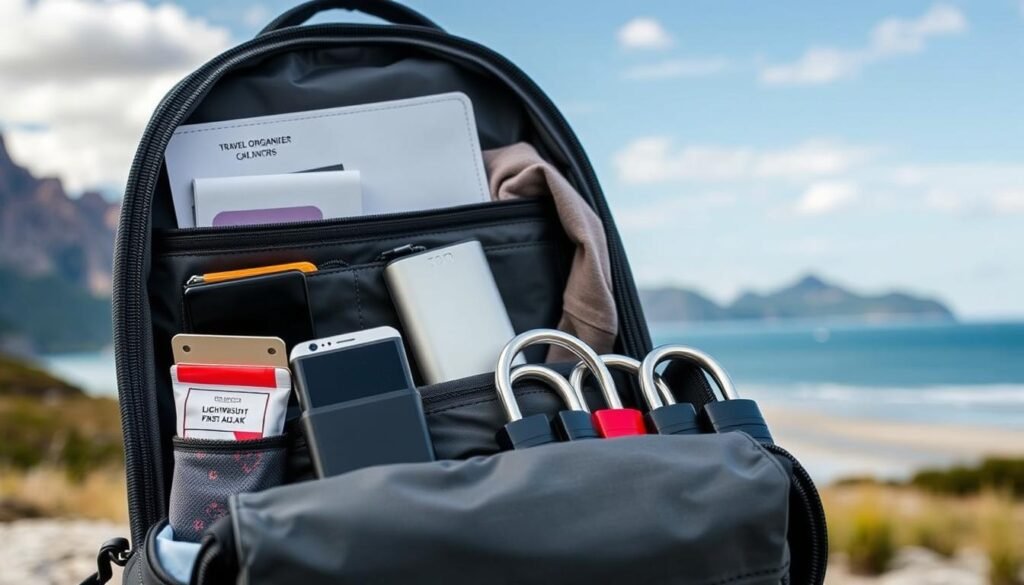
Solo Travel Safety Tips for City Navigation
As a solo traveler exploring cities, your personal safety should be a top priority. Navigating the urban landscape can pose unique challenges, but with the right strategies, you can confidently discover city safety for solo travelers, stay aware of your surroundings, and enjoy safe city exploration.
One crucial tip for urban navigation tips is to become familiar with the city map before venturing out. Study the layout, identify safe areas, and plan your routes in advance. This will help you avoid getting lost or wandering into potentially unsafe neighborhoods.
Maintaining situational awareness is key when exploring a new city alone. Keep your head up, make eye contact, and trust your instincts. If an area feels uneasy or you sense something is off, don’t hesitate to change your plans and seek a safer location.
- Familiarize yourself with the city map and plan your routes ahead of time.
- Stay alert and trust your intuition when navigating unfamiliar areas.
- Avoid displaying expensive items or valuables that could make you a target.
- Stick to well-lit, crowded streets and avoid isolated or poorly lit areas, especially at night.
- Consider using a navigation app or carrying a portable charger to ensure your phone remains powered on.
By following these city safety for solo travelers tips, you can confidently explore cities and unlock the joys of safe city exploration as a solo traveler.
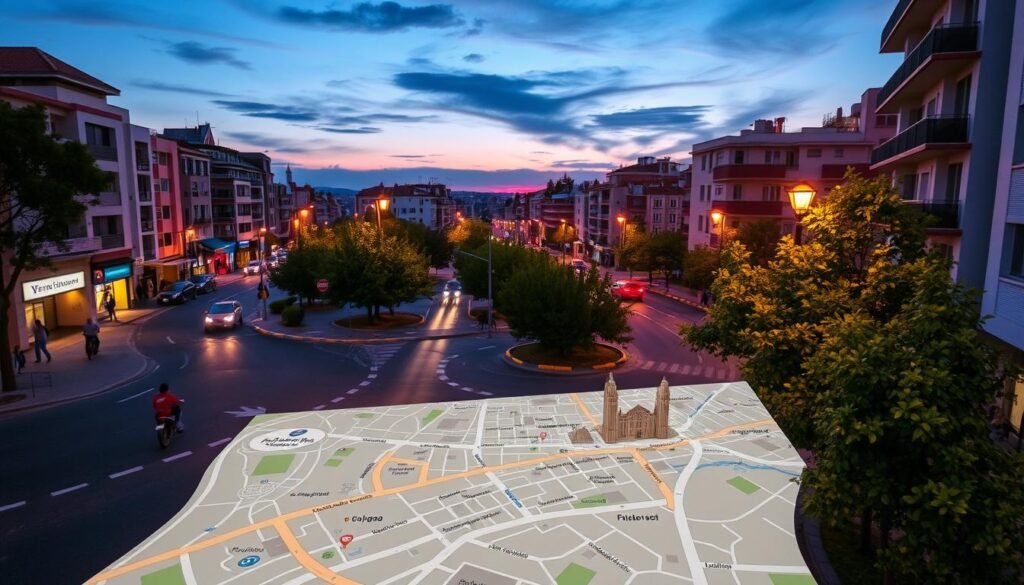
“Travelling alone will be one of the most rewarding experiences of your life. You will learn more about yourself than you ever imagined possible.” – Unknown
Digital Security and Data Protection Abroad
Traveling solo opens up a world of adventure and independence, but it also comes with unique digital security challenges. As you venture into new destinations, protecting your sensitive information and online transactions becomes paramount. By implementing smart strategies for securing your digital life, you can enjoy the freedom of solo travel without compromising your safety.
Secure Wi-Fi Connections
Public Wi-Fi networks, often found in airports, cafes, and hotels, can pose a significant risk to your digital security while traveling. Hackers can easily intercept your data and gain access to your accounts if you’re not cautious. Always use a reputable virtual private network (VPN) to encrypt your internet traffic and shield your online activities from prying eyes.
Password Protection Strategies
Your passwords are the keys to your digital kingdom, and they deserve extra attention when traveling. Avoid using the same password across multiple accounts, and consider using a password manager to generate and store strong, unique passwords for all your online services. Additionally, enable two-factor authentication whenever possible to add an extra layer of security to your accounts.
Digital Payment Safety
Securing your digital payments is crucial when making purchases or transferring funds while abroad. Opt for credit cards over debit cards, as they offer better fraud protection. Avoid using public computers or unsecured networks for sensitive financial transactions. If possible, consider using mobile payment apps that utilize biometric authentication, such as fingerprint or facial recognition, for added security.
By prioritizing digital security and data protection, solo travelers can navigate the world with confidence, safeguarding their personal information and enjoying the benefits of modern technology without compromise. Remember, a little proactive planning can go a long way in ensuring your digital safety during your adventures abroad.
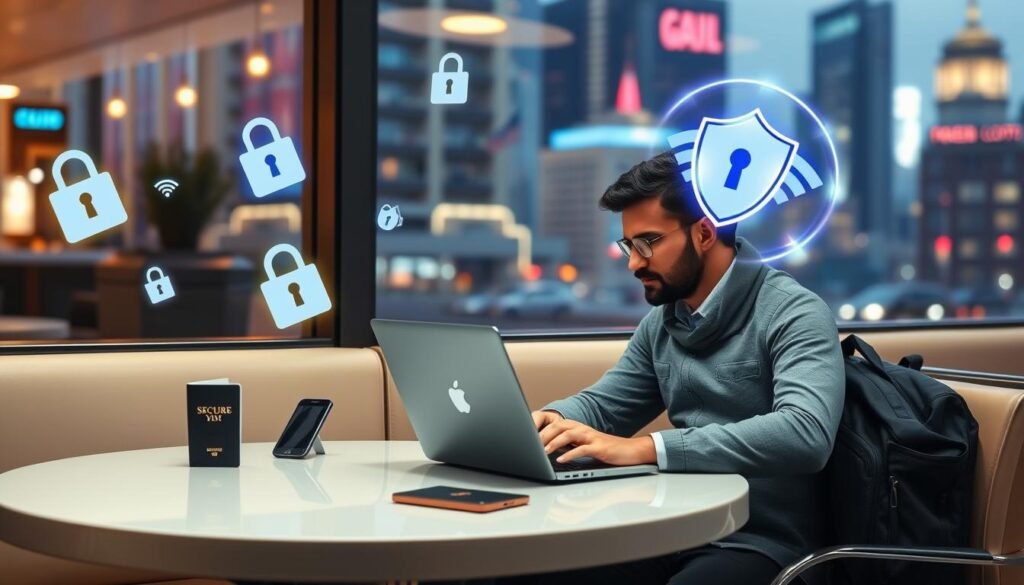
Building a Support Network While Traveling Solo
Embarking on a solo travel adventure can be an exhilarating experience, but it’s important to build a supportive network to ensure your safety and enjoyment. Connecting with fellow travelers and maintaining ties with loved ones back home can make all the difference in your solo travel journey.
Networking with Fellow Travelers
One of the best ways to create a support network while traveling solo is to actively engage with other solo travelers. Attend local meetups, join group activities, or visit popular solo travel hubs to meet like-minded individuals. These connections can lead to valuable solo travel networking opportunities, where you can share tips, recommendations, and even explore destinations together.
Staying Connected with Home
While the thrill of solo travel lies in embracing independence, it’s crucial to maintain strong social connections abroad with your loved ones back home. Regular check-ins, video calls, and sharing your experiences can help your support system feel involved and provide a sense of security. Additionally, consider sharing your itinerary and emergency contacts with trusted friends or family members to ensure they can reach you if needed.
Joining Group Tours and Activities
- Participate in group tours or activities such as walking tours, cooking classes, or day trips to meet fellow travelers and explore destinations together.
- Look for solo-friendly accommodations, such as hostels or social guesthouses, where you can easily interact with other solo travelers.
- Engage with local communities by volunteering or participating in cultural exchange programs, which can lead to meaningful social connections abroad.
By actively building a support network, solo travelers can enhance their overall experience, feel more secure, and create lasting memories through the connections they make along the way.
| Strategies for Building a Support Network | Benefits |
|---|---|
| Attending local meetups and group activities | Opportunities to meet fellow travelers and explore destinations together |
| Maintaining regular communication with loved ones at home | Provides a sense of security and social connections abroad |
| Joining solo-friendly accommodations and tours | Facilitates solo travel networking and makes connections with like-minded individuals |
Transportation Safety Guidelines for Solo Travelers
As a solo traveler, your safety when navigating the transportation landscape is paramount. Whether you’re hailing a taxi, using a rideshare service, or relying on public transportation, it’s essential to follow best practices to ensure a secure journey.
Taxi and Rideshare Safety
When opting for a taxi or rideshare, be a savvy passenger. Verify the driver’s identification and ensure the vehicle is licensed and insured. Avoid riding in the front seat and sit in the back to maintain a safer distance. Always keep your valuables close and avoid sharing personal information with the driver.
Public Transport Precautions
- Familiarize yourself with the local public transportation system and plan your routes in advance.
- Sit or stand near the front of the bus or train, close to the driver or conductor.
- Keep your belongings close and avoid displaying expensive items or cash.
- Be aware of your surroundings and trust your instincts if a situation feels unsafe.
Night Travel Considerations
Traveling at night can pose additional risks, so take extra precautions. Avoid walking alone, especially in dimly lit or isolated areas. If you must travel at night, opt for well-lit and populated routes, and consider arranging for a trusted local to accompany you. Ensure your phone is charged and keep emergency numbers at the ready.
| Transportation Mode | Safety Tips |
|---|---|
| Taxi/Rideshare | Verify driver, sit in the back, keep valuables close |
| Public Transport | Plan routes, sit near front, be aware of surroundings |
| Night Travel | Avoid walking alone, use well-lit routes, have phone charged |
By prioritizing safe solo transportation, employing travel safety tips, and being mindful of secure night travel, you can navigate your solo adventures with confidence and peace of mind.
Managing Money and Valuables Securely
Navigating the world as a solo traveler requires diligent financial management and safeguarding your personal belongings. Mastering the art of secure money management abroad and protecting valuables while traveling can make all the difference in ensuring a stress-free journey.
Secure ATM Transactions
When withdrawing cash from ATMs, be mindful of your surroundings and avoid using machines in isolated or poorly lit areas. Opt for ATMs located inside reputable banks or hotels to minimize the risk of safe cash handling issues, such as skimming devices or hidden cameras.
Carry Cash Strategically
- Divide your cash into multiple secure locations, such as a money belt, a hidden pocket, or a locked bag.
- Avoid flaunting large amounts of cash or removing your wallet in public view.
- Consider using a travel-friendly wallet or purse with RFID-blocking technology to protect your cards from unauthorized scanning.
Safeguard Important Documents
Keep your passport, IDs, and other vital documents secure by carrying them in a tamper-proof pouch or storing them in a hotel safe. Make digital copies of these documents and store them in a cloud-based storage service for easy access in case of emergency.
By adopting these proactive measures, you can ensure your secure money management abroad and protect your valuables, allowing you to focus on the joys of solo travel with greater peace of mind.
Cultural Awareness and Local Customs
Embracing the local culture is a crucial aspect of solo travel. As you explore new destinations, it’s essential to understand and respect the cultural norms and etiquette of the region. This not only enhances your travel experience but also fosters meaningful connections with the people you encounter along the way.
Dress Code Considerations
Paying attention to appropriate attire is key to showing respect for the local culture. Research the dress code expectations in your destination and adjust your wardrobe accordingly. Modest and conservative clothing may be required in some regions, while others may be more casual. Blending in with the local style can help you avoid drawing unwanted attention.
Communication Tips
Language barriers can present challenges, but making an effort to learn a few key phrases in the local language can go a long way. Familiarize yourself with common greetings, polite expressions, and basic conversational skills. This not only helps you navigate daily interactions but also demonstrates your respect for the local culture.
Local Etiquette Guidelines
Researching and adhering to local etiquette guidelines can enhance your cultural immersion and ensure you avoid inadvertently offending or disrupting the local way of life. This may include understanding appropriate behavior in public spaces, table manners, gift-giving customs, and other nuances of the region’s social norms.
FAQ
What are the essential pre-trip planning steps for solo travelers?
Essential pre-trip planning steps include organizing your documentation and emergency contacts, securing the right travel insurance coverage, and addressing any health-related preparations before your trip.
How can solo travelers choose safe accommodation?
When choosing accommodation, consider the location’s safety, read reviews from other solo travelers, and look for security features like secure entrances, 24/7 staff, and in-room safes.
What safety gear and emergency items should solo travelers pack?
Solo travelers should pack essential safety gear like a personal alarm, portable charger, and first-aid kit, as well as digital security items like a VPN and password manager.
How can solo travelers stay safe when navigating cities?
Use maps and navigation apps wisely, stay aware of your surroundings, and identify safe areas for exploration. Avoid isolated or poorly lit streets, especially at night.
What digital security measures should solo travelers take?
Connect to secure Wi-Fi networks, use strong passwords, and be cautious when making digital payments to protect your data and financial information while traveling.
How can solo travelers build a support network abroad?
Meet fellow travelers through group activities, stay connected with loved ones back home, and consider joining online travel communities to expand your support network.
What transportation safety guidelines should solo travelers follow?
Research taxi and rideshare services, use public transport cautiously, and exercise extra caution when traveling at night to ensure your safety while getting around.
How can solo travelers manage money and valuables securely?
Carry cash and cards discreetly, use ATMs wisely, and keep important documents and personal belongings safe to prevent theft or loss.
What cultural awareness tips are important for solo travelers?
Respect local dress codes, communicate effectively, and familiarize yourself with local etiquette guidelines to avoid offending cultural norms while traveling solo.

